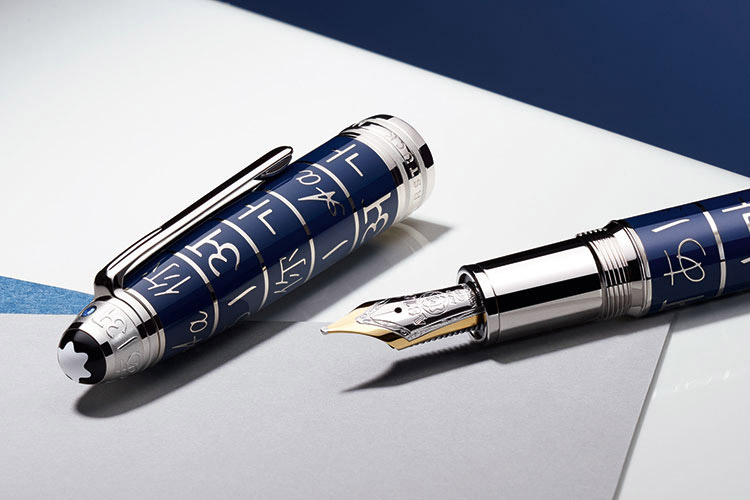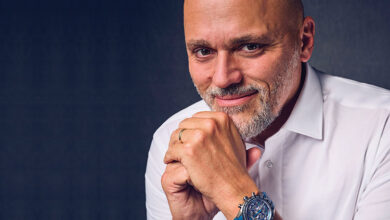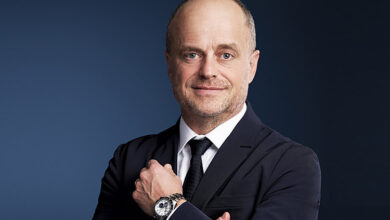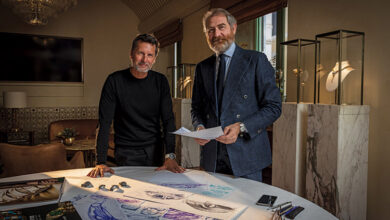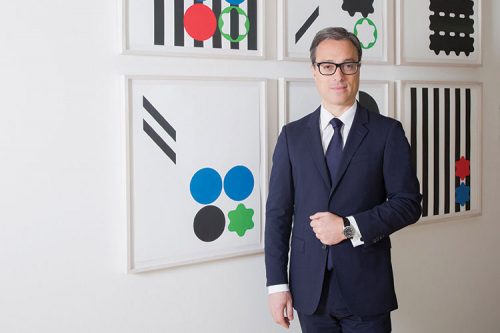
Montblanc watches, the brand that revels in doing the unexpected, first started its journey in 1924 with the creation of the Meisterstück fountain pen. Since then, the marque has climbed mountains high as its inspiration, and today is a luxury brand that excels in watches, leather goods and its inimitable writing instruments. Nicolas Baretzki, Montblanc International CEO, sat down with “Day & Night” magazine for an in-depth analysis of the maison’s horological expertise, and its mastery in all its product categories
Why was there more focus on the Heritage watch collection this year, while the 1858 collection took a backseat?
It was not exactly a backseat, our booth at the SIHH was themed around the 1858 because 1858 will become one of our key collections. The Geosphere is slated to become a hero product, and is definitely a talking piece right now. But we have to be careful because it would take a lay person more time to understand why it is considered a hero product. That is a long-time journey and we want to continue to work on the Geosphere and the 1858. We had the black version last year and the green khaki version this year, and the whole booth was about mountain exploration and re-connecting with nature. That is why we have the green colour. The feedback has been fantastic and it definitely is not on the backseat; it was a second strong push on the collection.
We had a very strong launch with Star Legacy last year; the Star is an emblematic product line for Montblanc as it was the first watch line we launched more than 20 years ago. We saw that it was important to have a vintage expression, like we have with the 1858 in the sports segment. Hence, this launch of a heritage line during the SIHH. It was meant to be vintage and a bit more intimate with the salmon dial, and the feedback has been amazing.
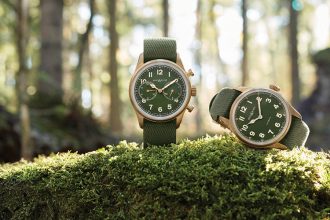
Today, this concept we have of making watches and going back to the Minerva era – taking inspiration of design elements from the Minerva story such as sapphire glass, the indexes, and the salmon dial – bring a vintage dimension in addition to the Minerva finishing in certain limited-edition movements. You really experience the Minerva story, in whatever way you enter the collection – you can enter by the story, the design, or by the movement – you are in the Minerva world. That I think is the main reason for the good feedback we have had during the fair.
How did you decide to unveil a Pulsograph, which is still very niche?
At Minerva, we have the Calibre 1321 with a monopusher. It is an important calibre in the history of Minerva. This concept of a Doctors’ watch is a good one. You can imagine a doctor with his old leather bag and an old watch – vintage from today’s perspective. It is a cool story and a very evocative one, and was well received. It is a limited edition; though it was used long ago, the story is an important part of it, add to it the execution, the movement, the salmon dial and the whole look of the case – all these are the reasons why people will buy this watch. I am sure that we will find 100 people who will find the story intriguing enough to buy it.
Can you tell us something about the Perpetual Calendar and how important is it for Montblanc to have one now?
At Montblanc we are focused on the traveller; as a brand, we are present everywhere in the travel market. In a way, the Perpetual Calendar is a perfect representation of the brand. All of our collections are done in the same way; we have these exclusive Minerva pieces that are limited edition, and are priced over EUR 20,000–25,000. Then we have the entry price, which is the positioning of Montblanc, very nice watchmaking and priced at around EUR2,000-5,000, but not with Manufacture movements. The in-between range is where we have our very fine watchmaking approach, with a unique proposition, such as the Geosphere. All of these have in-house movements; we get them produced outside, but we do the in-house movements. The Geosphere has an in-house movement as does the Perpetual Calendar. We have been doing Perpetual Calendars with in-house movement for more than three years. This is important because it showcases the watchmaking skills of Montblanc.
We were having a live interaction at SIHH and we said we would like to do Perpetual Calendars; I was modest and said Montblanc is ‘a true watchmaker’ and not that it is ‘the true watchmaker’. This kind of development also shows that we are a serious maison – we have our own engineers, we are developing our own movements, and in some cases, creating the whole movement in-house.
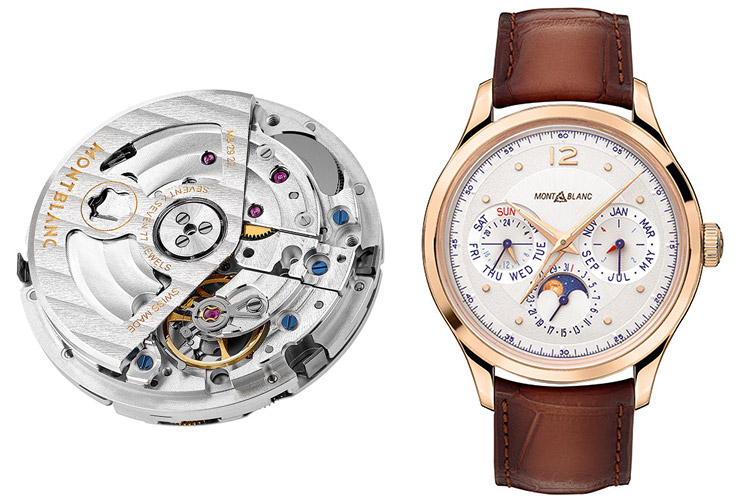
The new Montblanc watches has a display that is more off-centre and easier to read; your comment?
Exactly, and that is the difference between a regular calibre that you can buy in the market and a calibre specially developed in-house, where you can play around with it. The reason we have a good Perpetual Calendar today is because of the legibility. This is very important because a Perpetual Calendar has so much information on the dial that sometimes it is difficult to read. We also worked on innovation; you can set our Perpetual Calendar both forward and backward. This is very important because there are so many people who set the Perpetual Calendar wrong and then have to send it back to the brand for repairs, which is quite expensive. Our concept of working only on wheels and not the levers is, from the horological point of view, a very interesting development.
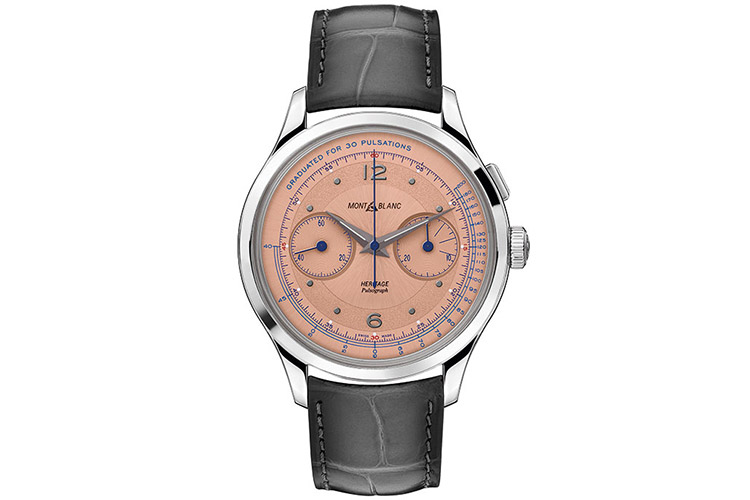
What percentages do you hope for in sales of leather goods and watches, which are now also contributing significantly to the brand, while historically, writing instruments have been the major source of income for the maison?
For me, the percentages are a result of client choices and the success of a certain product line; I don’t have objectives of percentages to be achieved in each category. This is because it is so different from one market to another. The average is only the result of 23 different subsidiaries, where sometimes leather can be the highest achieving; often writing instruments is the highest achieving. In new markets or markets that we entered from day one, all categories are performing well. Watches, especially in Asia, is a very important category; it really changes from one market to another. There is no market where watches are below 20 per cent; nor are leather and writing instruments. All are our main categories are at least 20 per cent of our total sales. But we grow everything so the shares are not changing so much. Writing instruments is still growing nicely, leather, large leather products, is booming. As for watches, now that we have finalised our approach, I expect sales to pick up quite a bit. But overall, I do not expect a big difference in the next two to five years.
What is your future plan to attract the younger clientele?
I have no plan because from what I have observed, we already have millennials coming in to Montblanc. It is not because we have the strategy to target millennials but more because the kind of products and the kind of purpose that is linked to the Montblanc maison brings millennials in naturally. Of course, the fact that we are launching some digital devices and some cool leather functions – all these are good reasons for them to come in. I see a lot of millennials, especially because this world is becoming digital, who come in to Montblanc to experience the history and true craftsmanship of Montblanc. You would be surprised at the number of millennials who come in to buy fountain pens, which is a bit counter-intuitive, because we would think only the older generation wants to buy fountain pens. This is not true because they want to experience the traditional writing mode, which is why vintage and special edition pens perform so well. They then prefer it because it is a work of art and has amazing craftsmanship, it is a great story you can relate to, it is a beautiful object, it is a status object, in addition to many other reasons. All of these are good reasons for the millennials and finally all of these are just part of our DNA. I think our founders of 1906 would be considered as entrepreneurs today – a bit crazy, disruptive and innovative – and we still carry that mindset through the 113 years of Montblanc history. That is why we are able to attract the millennials, and we are the same today in 2019.
Why has Montblanc not unveiled a pocket watch this year as has been the norm for the past few years?
We prefer not to do the expected thing; if we came with a pocket watch every year, it becomes an expected thing and you lose interest. It is a very tiny market; it is a great opportunity to come up with some special pieces, some special messages from a watchmaking point of view. But I think it would be a mistake to come up every year with a pocket watch; you need to keep it as something unique. It also adds value to the pocket watches of previous years to have only a small limited number of watches in the market.
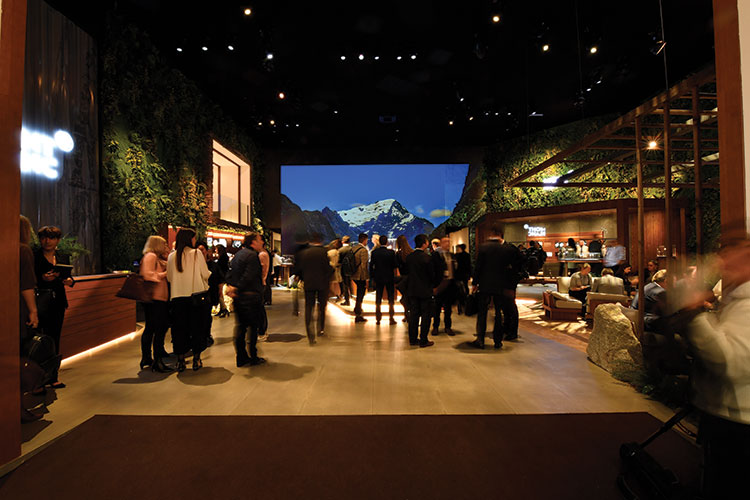
What is your solution to the fact that your large leather goods are taking up a lot of space in boutiques and display space is becoming an issue?
Sometimes we have too many products, but not enough stories or concepts. We have been extremely innovative in developing new leather, new textures, new materials, new functionalities, it is perhaps time to apply the same logic that we use with watches to leather goods also. Simplify our product lines so that our customers can better see what we have to offer at Montblanc. Perhaps we also need to simplify the number of our SKUs so that you can really tell the story. I think we need to tell more of the stories of our leather. We have an amazing product and we have an amazing Pelletteria in Florence, and capability in leather at Montblanc.
We have some good neighbours; our next-door neighbour is the biggest name in the leather industry today and the neighbour after that is another big maison and so we are really situated in a cradle of big-leather goods brands. We need to tell more of our story as Montblanc is really one of the leaders in the market for leather goods for men. I believe that we have a clear say in that world, but in our own way. We are not fashion and we definitely do not want to be one, but we can definitely explore new territories in leather; just the travel segment is a huge territory.
How are the productions issues – which you had in the beginning, where there was more demand than production – in the leather goods segment now?
I think in the last five years, we have become quite professional and have a good structure in place. But having said that, an issue in the leather good segment is that because we are a ‘Made in Italy’ brand, we make everything in Italy, and this makes it extremely difficult to do it. We are also the only one doing it, and we have had to re-build a proper construction line for luggage in Italy. This takes time and that is why we had the shortage issue the whole year, where we could never produce enough. It is just that the ‘Made in Italy’ concept took some time.
Given the amount of evolving of the brand recently, where exactly do you want the brand to be?
The brand is evolving because it is the nature of the brand, and it has been expanding since 1906 and it has been successful because it never stopped. Within the Montblanc territory, it has always been innovating and expanding in foreign territories. I do believe that the success of Montblanc lies in the fact that we master every category we do. So, when we make watches, we become master watchmakers; when we do leather goods, we excel at leather manufacture, and this is definitely true in writing instruments.
What is important for the maison in the years to come is to perhaps talk a little bit less of products and every category and talk more about the brand itself, and why you come to Montblanc. We want people to come to Montblanc not only because we have amazing products or because we have value for money, but because of the Montblanc brand and emblem. We want to explore much more the brand as a brand and as an umbrella for all categories; that is the direction we want to take.
